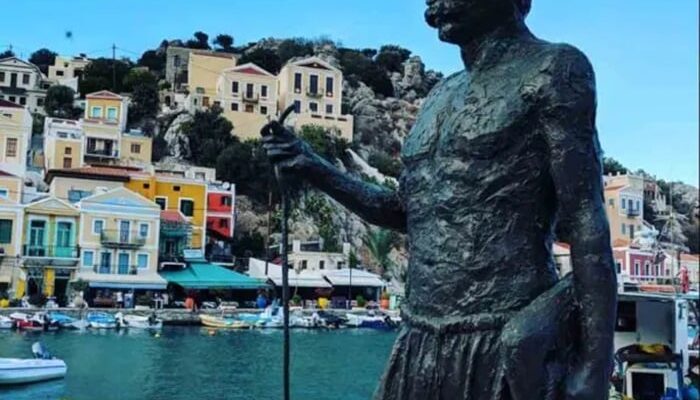A Greek sponge diver, named Stathis Hatzis, became a free diving legend in July 1913 when he reached a depth of 88 meters in an incredible dive lasting more than 3-1/2 minutes.
While today’s free divers have surpassed his depth, his record-breaking dive was an incredible achievement that captured global attention.
Hatzis was a sponge diver and local hero from the island of Symi, who managed to secure a line to the fouled anchor chain of the Italian battleship “Regina Margherita” off the island of Karpathos in 1913.
For three days, he had been performing several dives to unprecedented depths. On the third day, July 16, 1913 he finally located the anchor of the ship. Reaching a depth of 88 meters he succeeded to do what seemed impossible.
As a sponge diver, Hatzis had experience in diving much deeper than most swimmers are accustomed to, in order to reach those natural sponges that live on seafloors. Some of his dives would reach 100 meters in depth.
Greek diving legend held a 15 kg stone
Hatzis did not dive with a mask or a diving suit, but naked holding only a 15 kg stone to descend faster. When he reached the surface of the sea alive, he was almost unconscious having blood coming out of his nose.
The Italians, who at the time had the sovereignty of the Dodecanese islands including Karpathos and Symi, were left speechless. His extraordinary feat of showing courage made headlines.

He was rewarded with a gold medal and the right to travel free for life on any Italian ship of his choice. At the time he was living in the US, he was hit by cancer and was forced to come back to Greece, dying at the age of only 58.
Sponge diving has been practiced for untold centuries on the Dodecanese island of Greece, where the practice makes up a vital part of the economy and local identity.
The brave men who partake in this dangerous hunt must be at the peak level of physical fitness and extremely strong swimmers, as they must dive to incredible depths in the sea, sometimes without oxygen tanks or any similar equipment, in search of the sponges.
The sponge business in Greece and the US
The hunt for sponges, despite being not only dangerous, was also extremely lucrative. During the peak of the sponge trade, in the nineteenth through mid-twentieth century, sponges from Kalymnos were sent across Greece, the Mediterranean, and the world.
Records show that these precious goods were sent as far as Russia and throughout the Middle East.
Many Greek immigrants from the Dodecanese where the practice was widespread, moved to the US and brought sponge diving with them.
The most widely known example is the iconic city of Tarpon Springs, in Florida, where immigrants from the islands of Kalymnos and Symi began to dive for sponges in the Gulf of Mexico, making the city famous across the world for both its sponges and its distinctly Greek identity.



